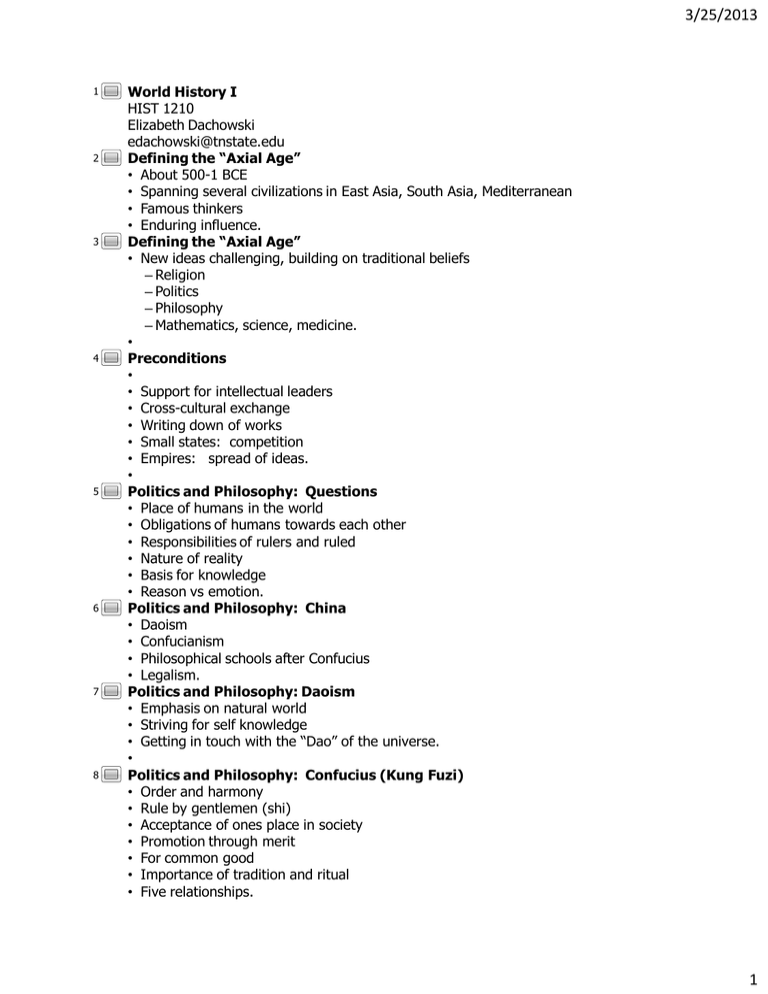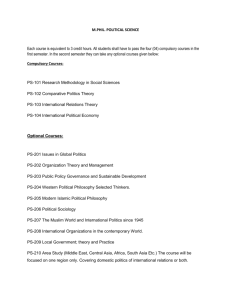3/25/2013
advertisement

3/25/2013 1 2 3 4 5 6 7 8 9 World History I HIST 1210 Elizabeth Dachowski edachowski@tnstate.edu Defining the “Axial Age” • About 500-1 BCE • Spanning several civilizations in East Asia, South Asia, Mediterranean • Famous thinkers • Enduring influence. Defining the “Axial Age” • New ideas challenging, building on traditional beliefs – Religion – Politics – Philosophy – Mathematics, science, medicine. • Preconditions • • Support for intellectual leaders • Cross-cultural exchange • Writing down of works • Small states: competition • Empires: spread of ideas. • Politics and Philosophy: Questions • Place of humans in the world • Obligations of humans towards each other • Responsibilities of rulers and ruled • Nature of reality • Basis for knowledge • Reason vs emotion. Politics and Philosophy: China • Daoism • Confucianism • Philosophical schools after Confucius • Legalism. Politics and Philosophy: Daoism • Emphasis on natural world • Striving for self knowledge • Getting in touch with the “Dao” of the universe. • Politics and Philosophy: Confucius (Kung Fuzi) • Order and harmony • Rule by gentlemen (shi) • Acceptance of ones place in society • Promotion through merit • For common good • Importance of tradition and ritual • Five relationships. Politics and Philosophy: Confucius (Kung Fuzi) 1 3/25/2013 9 10 11 12 13 14 15 16 1 17 2 18 Politics and Philosophy: Confucius (Kung Fuzi) • Five relationships – Father-son – Elder brother-younger brother – Husband-wife – Ruler-subject – Friend-friend Politics and Philosophy: After Confucius • Mencius (Meng Ko) – Humans are good by nature – Rule by consent of the governed – Right to overthrow unjust government. Politics and Philosophy: After Confucius • Xunzi – People begin neither good nor bad – Laziness pushes them towards bad – Strong government necessary. Politics and Philosophy: Legalism • Reaction against shi class • Obedience more important than ethics • Tyranny better than lawlessness • State more important than individual. Politics and Philosophy: Legalism • Severe penalties for disobedience • State resources: warfare, economic management, exaltation of leaders. • Politics and Philosophy: Buddhism • The Buddha = “The Enlightened One” • Four Noble Truths – Misery exists – Misery comes from desire – Desire can be overcome – The Eightfold Path can overcome desire Politics and Philosophy: Greece Politics and Philosophy: Greece • Socratics – Plato: • Knowledge from universals • Rule by philosopher kings. Politics and Philosophy: Greece • Socratics – Aristotle: • Observation • Syllogistic reasoning • Categories • Mixed rule (ruling elite limited by law). Science, Mathematics, and Medicine: Greece • Parmenides and Zeno of Elea 19 2 3/25/2013 18 19 • Parmenides and Zeno of Elea – Paradox of movement (impossibility of dividing time, matter). Science, Mathematics, and Medicine: Greece • Eratosthenes – Measurement of earth • Hippocrates – Ethical Code • Archimedes – Lever. 3


